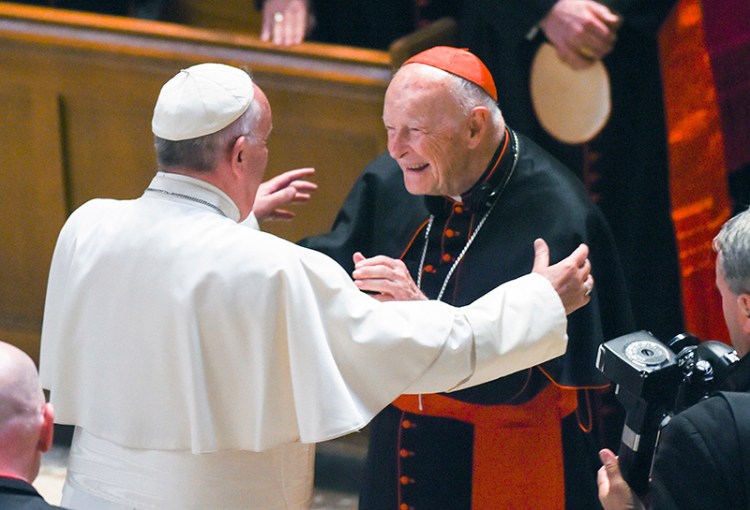Minors or adults can now confidentially report abuse or harassment by a bishop through a third-party phone and online complaint line not run by the church, the U.S. Conference of Catholic Bishops announced Wednesday.
The announcement came one week after leaders of the U.S. church met with Pope Francis on the matter, and soon after a cardinal and a bishop left their roles following allegations of sexual harassment.
Francis had met with three bishops last week at the Vatican to discuss the sexual abuse crisis that the leading U.S. bishop said has “lacerated” the church. Bishops are the leaders of the church across America.
The confidential third-party reporting system will direct complaints of sexual abuse of minors or sexual misconduct with adults by a bishop to “the appropriate ecclesiastical authority and, as required by applicable law, to civil authorities,” the announcement said.
The U.S. Catholic bishops’ statement called for a “full investigation” of retired Washington Archbishop Theodore McCarrick and said the inquiry should use lay experts in fields such as law enforcement and social services. But the statement, in a notable shift, did not mention the Vatican’s role in such a probe.
A month earlier, Daniel DiNardo, president of the U.S. Conference of Catholic Bishops, had suggested that the Vatican should help lead the investigation in what is known as an apostolic visitation. Neither the pope nor DiNardo has mentioned the visitation since their meeting last week.
This summer, McCarrick became the first U.S. cardinal to give up his red cardinal’s hat due to allegations of sexual misconduct. Two men say McCarrick molested them when they were minors, and others say he behaved in sexually inappropriate ways when they were young adult seminarians and priests.
Last week, Pope Francis accepted the resignation of West Virginia bishop Michael Bransfield, who has been accused of sexual harassment, and directed the Archdiocese of Baltimore to investigate Bransfield’s conduct.
Judy Keane, a spokeswoman for the bishops’ conference, said last week that she did not know whether the third-party operator would report cases directly to law enforcement or would report only to a church official, such as the Vatican’s ambassador, who could then choose when to contact authorities. She also did not know if the third-party operator had already been identified.
The bishops said they also will come up with policies on restricting bishops who were removed or resigned because of allegations of sexual abuse of children or misconduct or harassment involving adults, the announcement said. That step seems to also spring from McCarrick’s case.
Archbishop Carlo Maria Viganò, the former apostolic nuncio to the United States, made the shocking allegation in a widely circulated letter last month that Popes Benedict and Francis both knew about McCarrick’s misconduct with adults for years. Viganò claims that Benedict secretly sanctioned McCarrick, telling him not to celebrate Mass or otherwise appear as a cardinal in public while retreating to a life of prayer but that Francis let those sanctions slip.
While Viganò’s claims about the secret sanctions remain unproven, his much-debated letter has prompted debate about how the church ought to restrict the activities of former leaders who have been disgraced.
Finally, the bishops called for a new code of conduct that will address not just sexual misconduct by bishops but also negligence in handling abuse cases. That is the charge against DiNardo and fellow cardinal Donald Wuerl of Washington, who has said he will soon discuss his potential resignation with Francis.
The day before DiNardo led the small delegation of U.S. bishops to the Vatican to meet with the pope about sexual abuse, the Associated Press reported that a woman claimed to have told DiNardo about her abuse as a teenager by a priest in his Archdiocese of Galveston-Houston in 2010. DiNardo promised her the priest wouldn’t work with children, the woman told police – but the man remained a parish priest until last week, when he was arrested by police on charges of molesting that woman and another then-minor.
The Pennsylvania grand jury report which has prompted renewed focus on abuse in the Catholic church since its release last month also focused on the role of bishops in handling abuse cases. Wuerl, who was bishop of Pittsburgh for 18 years, is described in the massive grand jury report as an inconsistent leader who sometimes worked hard to keep accused abusers out of churches but other times let them return to ministry. That report has led to intense calls for his resignation, which he said last week that he will soon discuss with Francis.
Robert Ciolek, a former priest who reached an $80,000 settlement with three New Jersey dioceses after saying McCarrick – then his superior – gave and demanded unwanted back rubs, called the announcement “a positive first step of many others needed to be taken.” Ciolek has alleged other abuse in New Jersey, including at the hands of a high school teacher when he was a teenager at a Catholic school.
Ciolek, now an attorney, praised the USCCB’s inclusion of the option of a third-party complaint line and the part of the announcement that called for an investigation into McCarrick involving lay investigators.
But, he said, more clarity was needed on how the third-party reporting system would be work. “My only hesitation is that the USCCB has no authority over the hundreds of bishops,” he said. “So who says: ‘Thanks guys, but no thanks,’ and doesn’t implement it?”
The Washington Post’s Tara Bahrampour, Michelle Boorstein and Chico Harlan contributed to this report.
Send questions/comments to the editors.



Comments are no longer available on this story